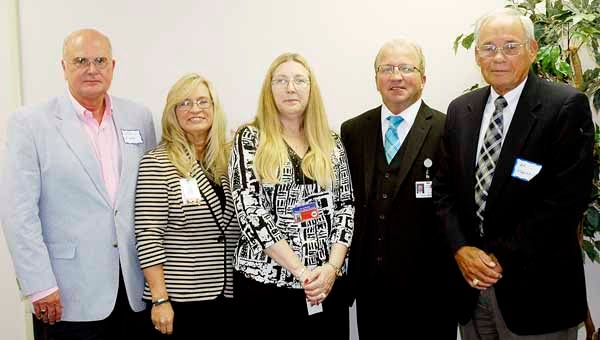Hospital hosts health program
Published 11:00 pm Thursday, August 22, 2013

The Health and Human Services Committee of the Pike County Chamber of Commerce welcomed Paul J. Butler, director Children and Family Services, DHR State of Alabama, to its quarterly meeting at Troy Regional Medical Center Thursday. Pictured from left, John Little, Chairman of the Board, Teresa Grimes, TRMC CEO/Administrator and Chairman of the Chamber Health and Human Services Committee, Florence Mitchell, DHR Director, Butler and Don Schofield, East Central Mental Health executive director.
Troy Regional Medical Center hosted the first quarterly meeting of the Pike County Chamber of Commerce’s Health and Human Services program at noon Thursday.
Kathy Sauer, Chamber executive director, said quarterly meetings are planned as networking opportunities for Chamber members.
“At each of these programs, we will have guest speakers who discuss topics that are relevant to health and human services,” Sauer said. “The programs are designed to broaden our knowledge and heighten our understanding of different areas of the health and human services that affect our community.”
Sauer said the luncheon programs will also provide opportunities for Chamber members to learn more about each other and the roles they assume in the Pike County community.
“As a result of these programs, we will be better able to serve the people of Pike County,” Sauer said. “That is what we are all about – service.”
Teresa Grimes, TRMC CEO and program chair, said the Chamber gathering was a dynamic group of people who work together to make Pike County a better community.
Grimes said the health and human service programs will be of value in identifying problems and issues in the community and in how the Chamber members can complement each other.
Paul J. Butler, director of Children and Family Services, Department of Human Resources, was the guest speaker for the lunch meeting.
Don Schofield, director, East Central Mental Health, introduced Butler as “Mr. Fix It.”
“Whenever there’s a problem at DHA, we call Paul Butler and Mr. Fix It can fix it,” Schofield said.
Butler, a 1987 graduate of UAB, began his career in child welfare in 1988 and has served in several capacities over the years. He was named director of Family Services for the state DAR in 2005 and continues to serve in that capacity.
Butler said DHR is Alabama’s primary social service agency. While DHA protects children from abuse and neglect, it also provides a variety of services to Alabama’s citizens, including adult protective services, food assistance, foster care, adoption, family assistance and services and childcare.
Butler focused attention on child abuse and neglect which continues to be a concern in Alabama as well as across the nation.
In FY2012, Butler said 45,000 incidents of alleged child abuse and neglect were reported to the department and 5,022 children were in foster care in Alabama.
Some of the children need foster care for a matter of days while others need foster care until they are reunited with their biological families or a plan is made for them to be adopted.
“We do not rush to pick up an order and remove a child but there are times when a child can’t remain at home,” Butler said. “Removing a child can be traumatic, especially when the child is placed in a different area, away from other family members, their friends and their school.”
Butler said children often come into foster care from horrendous situations and need specialized care.
The best situations for a child in foster care are to be returned to his or her biological family or adopted.
Butler said the DHR is working with the Federal government on initiatives to safely reduce the number of kids in foster care. Alabama has been successful in reducing the number from 7,000 in 2008 to 5,000 in 2012.
The reduction of psychotropic medications to alter behavior is a goal of DHR with increased focus on behavior intervention as a more desired method.
Bulter said all children need a caring and committed family that offers them the future they deserve. That is the commitment of DHR.



